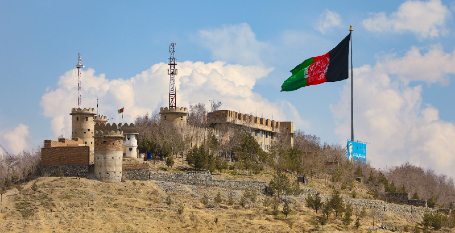The Taliban have reportedly flogged a group of people in a crowded football stadium for “moral crimes” including gay sex.
Taliban officials have informed the BBC that 12 people were lashed in front of thousands of onlookers in the eastern Logar province.
The people flogged received between 21 and 39 lashes each, with the maximum a person can receive being 39 - according to reporting. The public punishments indicate a strengthening of the Taliban's commitment to enforce Sharia law across the country.
It's yet another reminder that LGBTQ people are at extreme risk of persecution and death in Afghanistan - a risk that significantly increased since the Taliban returned to power in 2021.
Local people report having their phones searched, as the authorities try to identify LGBTQ people through their social networks.
What’s life like for LGBTQ people in Afghanistan?
Is homosexuality legal in Afghanistan?
No. It was illegal under the Penal Code of the previous government. It is also illegal under the Sharia law applied by the Taliban.
Homosexuality is seen as a taboo subject, and something that goes against the Islamic religion which is the official religion of Afghanistan.
Anyone accused of being homosexual is at risk of being killed.
Is there any legal recognition of same-sex relationships in Afghanistan?
Unsurprisingly, there is no legal recognition of same-sex relationships in Afghanistan.
Are there any discrimination protections for LGBTQ people in Afghanistan?
Because of the criminalisation of homosexuality, and the socially-conservative nature of Afghan society, there are no protections available to people on the basis of sexuality.
The contradiction of prostitution
While homosexuality is taboo, there is a history of younger men being used as prostitutes – or dancing boys – to satisfy the sexual needs of older men. The boys are trained to dance seductively at men-only parties.
This is seen as a Persian custom, known as Bacha Bazi – boy play. It’s partly driven by the strict social rules surrounding interaction between men and women.
Despite Bacha Bazi being illegal under Afghan law, authorities are unable to end the practice because many of those involved are influential men. To these men, keeping a bacha baireesh – a boy without beard – is a sign of power and high social status.
In the 1990s, bacha bazi was outlawed by the Taliban, with sodomy, dancing and music carrying the death penalty – although the militant group have been accused of participating in the practice themselves.
The Boy Who Danced on Air
Created in 2017 by Charlie Sohne and Tim Rosser, The Boy Who Danced on Air is a musical that explores the world of the dancing boys of Afghanistan.
The musical is a love story between a 16-year-old boy, Paiman, and another young boy caught in the same bacha bazi practice.
It’s been criticised for glorifying the Bacha Bazi practice and distorting the experience of queer people in Afghanistan.












 列印版本
列印版本


















讀者回應
請先登入再使用此功能。